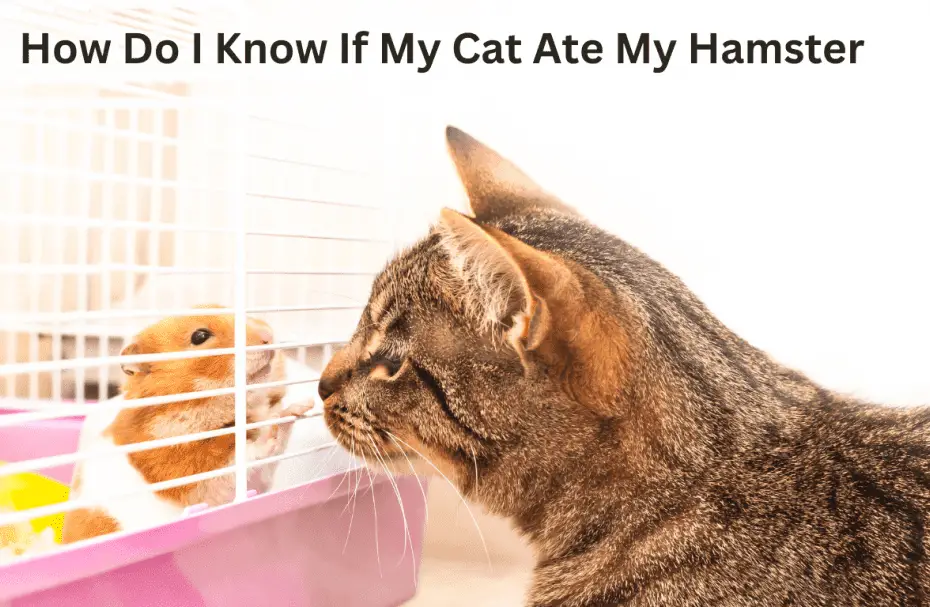If you have a cat and a hamster living in the same house, chances are at some point your cat is going to try to eat your hamster. While most cats will not be able to actually kill and eat a healthy adult hamster, they can definitely injure them. So, how do you know if your cat ate your hamster?
If you have a hamster that has gone missing, and you also have a cat, it’s possible your cat ate your hamster. Here are some things to look for that may indicate this:
-Your hamster cage is empty and there is no sign of forced entry.
-You find fur or other small animal remains near where your cat spends time.
-Your cat seems unusually lethargic or unwell.
If you suspect your cat has eaten your hamster, take them to the vet immediately as they may need treatment for blockages or other health problems.
What Will a Cat Do to a Hamster?
A cat will likely attack and kill a hamster. Cats are natural predators of small rodents, and hamsters are no exception. A hamster in the wild would be easy prey for a cat, and even domestic hamsters are not safe from their feline roommates.
If you have a cat and a hamster living together in your home, it is important to monitor them closely to ensure the safety of the hamster.
How Do I Get My Cat to Stop Eating Hamsters?
If your cat has a taste for hamsters, there are a few things you can do to try to discourage the behavior. First, make sure the hamsters are well-secured in their cage so that your cat can’t get to them. You may also want to try spraying the cage with a bitter tasting spray or placing double-sided tape on it so that your cat doesn’t enjoy the experience of trying to get to the hamsters.
Another option is to feed your cat separate from the hamsters. This way, they won’t associate eating with hunting and killing small animals. Finally, if all else fails, you may need to keep your cat and hamsters in separate rooms or even find a new home for the latter.
Do Cats Mess With Hamsters?
No, cats generally don’t mess with hamsters. Hamsters are small and vulnerable, and cats are predators. However, there have been a few reports of cats killing hamsters.
It’s important to keep an eye on your pets if you have both a cat and a hamster, just to be safe.
Do Cats Stress Hamsters Out?
No, cats do not stress hamsters out. In fact, they can actually be quite good companions for each other. Cats are natural hunters and will sometimes see a small animal like a hamster as prey.
However, if they are raised together from a young age, they can learn to coexist peacefully.
My Cat Killed My Hamster
It is not uncommon for cats to kill hamsters. In fact, it is one of the most common reasons that people get rid of their cats. There are a few things that you can do to try and prevent your cat from killing your hamster, but ultimately it is up to the cat.
The best thing that you can do to prevent your cat from killing your hamster is to keep them separated. This means having two separate cages for each animal. If you cannot have two cages, then put the hamster’s cage on a high shelf or in a room that the cat cannot access.
You should also try and train your cat not to hunt small animals. This can be done by using a water bottle to spray them every time they go near the hamster’s cage. With enough training, they should eventually learn to stay away from the cage.
If you have tried everything and your cat still kills your hamster, then you may need to rehome one of the animals. It is unfair to both the cat and the hamster to keep them in a situation where one is constantly at risk of being killed by the other.
Can Cats Have Hamster Food
As much as your kitty may beg for a nibble of your hamster’s food, it’s not a good idea to let her indulge. Hamster food is very high in protein and fat, which can cause gastrointestinal upset in cats. In addition, the small pieces of kibble can present a choking hazard.
If you must share your home with both a cat and a hamster, be sure to keep their food bowls in separate areas to avoid any potential problems.
Sleeping Hamsters
If you’re looking for a low-maintenance pet that’s both cute and cuddly, look no further than the hamster! These furry little creatures make great pets for kids and adults alike, and they’re relatively easy to care for. One important thing to keep in mind, however, is that hamsters are nocturnal animals.
This means they sleep during the day and are active at night.
If you’re wondering how much sleep your hamster needs, the answer depends on the individual animal. Some hamsters may sleep up to 14 hours per day, while others may only need 10 or 12 hours of shut-eye.
It’s important to let your hamster sleep as much as it needs; too little sleep can lead to health problems down the road.
When it comes to where your hamster sleeps, there are a few different options. You can purchase a small cage specifically designed for hamsters, which will usually include a sleeping area.
Or, if you have a larger cage for your furry friend, you can simply designate one corner as the sleeping area and provide some soft bedding material such as shredded paper or cloth.
One final note on sleeping hamsters: if you have more than one of these adorable pets, don’t house them together in the same cage! Hamsters are notorious for being territorial and may fight with each other if housed together.
It’s best to keep them in separate cages so everyone can get a good night’s sleep!
Dead Hamster
There are many reasons why a hamster may die, and it’s important to be aware of the signs that something is wrong. A sudden death is often a sign of illness, so it’s important to take your hamster to the vet if you notice any changes in behavior or appearance. If your hamster dies, it’s important to clean out its cage and disinfect it thoroughly to prevent the spread of disease.
Conclusion
If your cat has been in the same room as your hamster, it’s possible that your cat ate your hamster. Here are some signs to look for:
– Your hamster is missing and there is no sign of him anywhere.
– You find evidence of a struggle, such as fur or blood, in the room where your hamster was last seen.
– Your cat is acting unusually lethargic or has an unusual appetite.
If you suspect that your cat ate your hamster, take him to the vet immediately.
- understanding hamster body language - April 22, 2024
- In The Wild: Exploring The Lives Of Wild Hamsters - April 22, 2024
- Leaky Bladders And Urinary Woes: Understanding Hamster Urinary Issues - April 22, 2024


